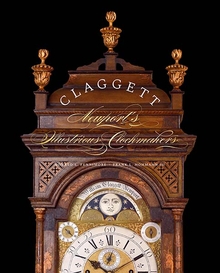What Ticked Off William Claggett
On Thursday, 13 December, the Newport Historical Society will have its annual meeting. Dr. Elaine Forman Crane will speak on “The Vintner and the Indian,” and the society staff will unveil the revamped NewportHistory.org website. That starts at 4:00 P.M. at the Colony House in Washington Square.
That Thursday evening, the society will celebrate the opening of a new exhibit titled “‘My small Ability’: The Life and Work of William Claggett,” inspired by the new book Claggett: Newport’s Illustrious Clockmaker by Donald L. Fennimore and Frank L. Hohmann III.
Claggett made clocks in Newport from 1716 until his death in 1748, and also trained other craftsmen. The exhibit features tall case clocks by Claggett and his trainees, clothing, maps, a mahogany board, and the Claggett wall clock in the society’s Seventh Day Baptist Meeting House. Also included are copperplates that Claggett engraved to print Rhode Island currency. And there are more Claggett clocks on display at the Redwood Library.
As a good New Englander, Claggett also got involved in religious disputes. The society recently ran a blog post by scholar Margaret Hanson about his 1721 book A Looking-Glass for Elder Clarke and Elder Wightman And the Church under their Care, about a controversy at the Second Baptist Church:
The exhibit opening starts at 6:30 P.M. at the society’s Resource Center, 82 Touro Street in Newport. Like the annual meeting, it is free and open to the public. Register for space here.
That Thursday evening, the society will celebrate the opening of a new exhibit titled “‘My small Ability’: The Life and Work of William Claggett,” inspired by the new book Claggett: Newport’s Illustrious Clockmaker by Donald L. Fennimore and Frank L. Hohmann III.
Claggett made clocks in Newport from 1716 until his death in 1748, and also trained other craftsmen. The exhibit features tall case clocks by Claggett and his trainees, clothing, maps, a mahogany board, and the Claggett wall clock in the society’s Seventh Day Baptist Meeting House. Also included are copperplates that Claggett engraved to print Rhode Island currency. And there are more Claggett clocks on display at the Redwood Library.
As a good New Englander, Claggett also got involved in religious disputes. The society recently ran a blog post by scholar Margaret Hanson about his 1721 book A Looking-Glass for Elder Clarke and Elder Wightman And the Church under their Care, about a controversy at the Second Baptist Church:
The trouble began when the church Elders, Daniel Wightman and James Clarke, suspended church member John Rhodes from communion following a complaint regarding his business practices. Claggett felt that Rhodes’s dismissal was unfair. In response, he and another congregant, Captain John Rogers, withdrew from communion.Not surprisingly, Claggett ended up leaving that church.
This led to further disagreements: while Claggett and Rogers protested the church Elders’ decision to suspend Rhodes, others defended them and reprimanded Claggett and Rogers for withdrawing from the communion. The dispute continued over the next 21 months, as Claggett, Rogers, Rhodes, the church elders, and various other congregants argued during church meetings, in private conversations, in publications, and through written correspondence.
Recently, we discovered a folder among Second Baptist Church records in the NHS archives containing exciting materials related to the Looking-Glass dispute. The newly discovered materials include letters (both originals and manuscript copies) exchanged among the disputants in 1720 and 1721, several of which are reproduced in A Looking-Glass.
The folder also contains a booklet titled A Just Vindication (1721) which outlines the church’s defense of the elders and complaints regarding Claggett. While Claggett’s Looking-Glass does not include a full reproduction of A Just Vindication, this document was important in motivating him to write and publish his own version of the dispute. Furthermore, the final section of Claggett’s book, titled A Reply to Your Un-just Vindication, is dedicated to refuting the church’s arguments and narrative.
The folder also contains several letters written between 1723 and 1725, after the publication of Claggett’s Looking-Glass, which comment on its contents, as well as its author.
The exhibit opening starts at 6:30 P.M. at the society’s Resource Center, 82 Touro Street in Newport. Like the annual meeting, it is free and open to the public. Register for space here.


No comments:
Post a Comment